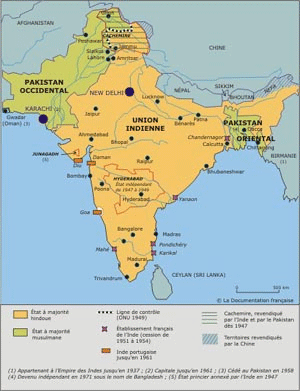Underlying causes of the Partition of Pakistan & India:
a) British departure: The cost of India was too high for Britain. The removal of a colonial power which frequently served to consolidate interethnic tensions led to the resurgence of such conflict between the colonized communities.
b) Conflict between communities had persisted for centuries (possibly longer) but the competing political movements opened the flood-gates. During uncertain times human beings tends to rally around what is most psychological comforting. For example, their relatives, their religious denominations, their perceived Nation. These groups tend to turn to their signposts and pit themselves against the Other which threatens their resources, community, and lives: (See Henry E. Hale, The Foundations of Ethnic Politics: Separatism of states and nations in Eurasia and the World)
c) Institutional Advantage for Nation-State Creation: The preexisting institutional structure of India provided the transitional infrastructure for an independent India. The somewhat federated structured of Indian dynasties allowed for the transition to quickly produce a clear delineation between Muslim and Sihk and Hindi Indians. (Phillip G. Roeder, Where Nation-States come from: Institutional Changes in the age of nationalism).
d) Mobilization by politicians through the available divisions in society. Politicians divide for their own sake: power through using the signposts available to them. In regions where there is no clear majority, mobilization along ethnic lines is not tenable. Where there is a majority, lack of economic opportunity, and insecurity, politically motivtedviolence is produced. Such violence may be culturally enforced as well. In the Muslim league, there was a fear of zamindar system (http://en.wikipedia.org/wiki/Zamindari) being abolished which would weaken the power of the zamindar families, for example. Partition was justified because it was better to abandon a united Indian in order to avoid policy standardization from a socialist central government in New Delhi. 
Nehru supported a united India but accepted partition because there was inequality between Muslim and Hindu peoples. Jinnah of the Muslim League was completely unwilling to move on the issue of India’s partition. His support for a new Muslim state as Pakistan was based on the issue of democratic representation of a Muslim minority. One year after the partition he died. Had he died earlier partition may have been avoided but this is speculative and another political leader might well have advanced Jinnah’s goals in his place. The Partition is another dubious sign of cultural groups with deeply divergent philosophies of being able to co-exist under a unified state.
